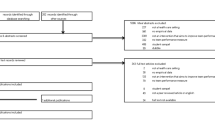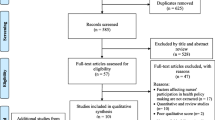Abstract
Introduction Return to work (RTW) coordinators are a key element in programs that facilitate RTW of injured or ill workers, yet little research documents the competencies required for success in this role. Methods Competencies were defined as knowledge, skills, attitudes, and behaviors. Eight focus groups were conducted with 75 experienced RTW coordinators to identify 904 individual competencies. These were subsequently reduced to 234 unique items through affinity mapping, and sorted into eight groups: administration, individual personal attributes, information gathering, communication, professional credibility, evaluation, problem-solving, and conflict management. A subset of 100 items, including 88 items most often cited, were incorporated in an Internet-based survey that sampled a broad range of RTW coordinators from three countries. Results Eighty-three of the questionnaire items were rated 4 or 5 (very important or essential) by over half of the 148 respondents. There were no differences in affinity group mean ratings by country, employer, profession, or type of clients. The highest-rated items reflect general personal characteristics, or specific skills related to coordinating among all involved with the RTW process. RTW coordinators with nursing backgrounds provided slightly higher ratings for items related to medical knowledge, but otherwise their ratings were similar to non-nurses. Conclusions These findings indicate a consensus across a wide range of RTW coordinators, and results can be applied to improve coordinator selection, training, and development. Certain key competencies may be well-established individual attributes, and others may be best developed through mentorship. Most of these competencies are probably best evaluated by direct observation.
Similar content being viewed by others
References
Pransky GS, Shaw WS, Franche RL, Clarke A. Disability prevention and communication among workers, physicians, employers, and insurers-current models and opportunities for improvement. Disabil Rehabil. 2004;26:625–34.
Franche RL, Cullen K, Clarke J, Irvin E, Sinclair S, Frank J. The Institute for Work & Health (IWH) workplace-based RTW intervention literature review research team. Workplace-based return-to-work interventions: a systematic review of the literature. J Occup Rehabil. 2005;15:607–31.
Durand MJ, Vezina N, Loisel P, Baril R, Richard MC, Diallo B. Workplace interventions for workers with musculoskeletal disabilities: a descriptive review of content. J Occup Rehabil. 2007;17:123–36.
Shaw WS, Hong QN, Pransky GS, Loisel P. The role of return-to-work coordinators in preventing workplace disability: a review and synthesis of the intervention literature. J Occup Rehabil. 2008;18:2–15.
National Institute on Disability Management and Research. Occupational standards in disability management: establishing criteria for excellence in Canada. Victoria: NIDMAR; 1999.
Return to Work Coordinator Training. Victoria WorkCover Authority. http://www.rtwtraining.com/Training.pdf. Accessed 29 Oct 2008.
Certified Professional Disability Manager. Insurance Education Institute and the Disability Management Employer Coalition. http://www.ieatraining.com/programs/cpdm.asp. Accessed 15 Sep 2009.
Rosenthal D. A new role and function study to showcase new trends in disability management. CDMS Connection. 2008;Fall:1–3.
Marrelli AF, Tondora J, Hoge MA. Strategies for developing competency models. Adm Policy Mental Health. 2005;32:533–61.
Mirabile RJ. Everything you wanted to know about competency modeling. Train Dev. 1997;51:73–7.
Hoge MA, Tondora J, Marrelli AF. The fundamentals of workforce competency: implications for behavioral health. Adm Policy Mental Health. 2005;32:509–31.
Holtzblatt K, Jones S. Contextual inquiry: a participatory technique for system design. In: Schuler D, Namioka A, editors. Participatory design: principles and practices. Hillsdale: Erlbaum; 1993. p. 177–210.
Shippman JS, Ash RA, Carr L, Hesketh B, Pearlman K, Battista M, et al. The practice of competency modeling. Personnel Psychol. 2000;53:703–40.
Salazar MK, Graham KY, Lantz B. Evaluating case management services for injured workers. Use of a quality assessment model. AAOHN J. 1999;47:348–54.
Shrey DE, Lacerte M, editors. Principles and practices of disability management in industry. Winter Park: GR Press; 1995.
Lippel K. Therapeutic and anti-therapeutic consequences of workers’ compensation. Int J Law Psychiatry. 1999;22(5–6):521–46.
Davis D, Taylor-Vaisey A. Translating guidelines into practice: a systematic review of theoretic concepts, practical experience and research evidence into the adoption of clinical practice guidelines. Can Med Assoc J. 1997;157:408–16.
Russo D, Innes E. An organizational case study of the case manager’s role in a client’s return-to-work programme in Australia. Occup Ther Int. 2002;9:57–75.
Landon BE, Normand SL, Blumenthal D, Daley J. Physician clinical performance assessment: prospects and barriers. JAMA. 2003;290:1183–9.
Drotos C. Credential losing credence. Behav Health Manag. 2001;21:1.
Acknowledgments
This research was supported by a research grant from the Workplace Safety and Insurance Board of Ontario to the Charles LeMoyne Hospital Research Center. The authors gratefully acknowledge the support of Judy Geary of the WSIB in the development of this project, Mary Wyatt for organizing the Australian focus groups, and Michelle Robertson of the Liberty Mutual Research Institute for guidance on the affinity mapping process. We are also indebted to Susan Katz Sliski, Mary Jane Woiszwillo and Joanna Willetts for assistance with affinity mapping.
Author information
Authors and Affiliations
Corresponding author
Rights and permissions
About this article
Cite this article
Pransky, G., Shaw, W.S., Loisel, P. et al. Development and Validation of Competencies for Return to Work Coordinators. J Occup Rehabil 20, 41–48 (2010). https://doi.org/10.1007/s10926-009-9208-x
Published:
Issue Date:
DOI: https://doi.org/10.1007/s10926-009-9208-x




